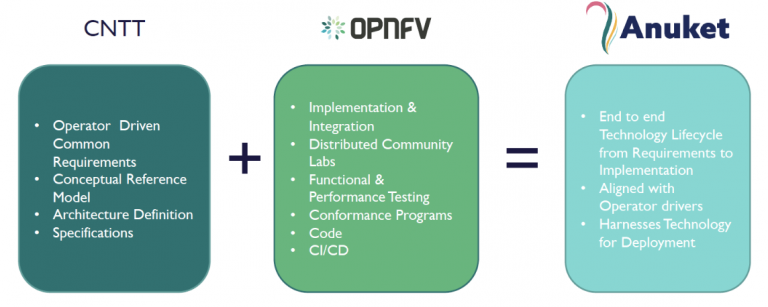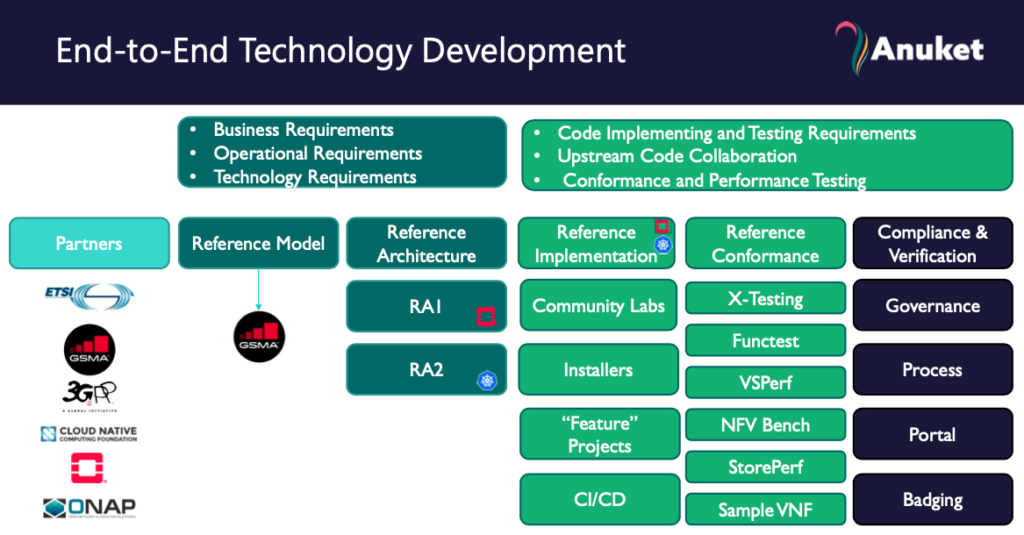By: Al Morton, TSC Co-Chair, Anuket
It is my great honor to announce and describe the Kali Release of the Anuket Project in the Linux Foundation Networking (LFN) organization.
 As the Anuket Project’s first release, Kali benefits from the combined expertise and contributions from the two organizations that merged early this year: the Open Platform for NFV (OPNFV) open source project in LFN and the Cloud iNfrastructure Telco Task Force (CNTT). Many work streams developing Reference specifications and projects developing implementations, testing utilities, telemetry collection and management, and other capabilities comprise the Kali Release.
As the Anuket Project’s first release, Kali benefits from the combined expertise and contributions from the two organizations that merged early this year: the Open Platform for NFV (OPNFV) open source project in LFN and the Cloud iNfrastructure Telco Task Force (CNTT). Many work streams developing Reference specifications and projects developing implementations, testing utilities, telemetry collection and management, and other capabilities comprise the Kali Release.
For the AIRSHIP Installer, the Kali release brings enhanced support of OpenStack provider network and QOS in the Anuket RI-1 and further alignment to the RC-1 policy settings. As a result, the Reference Compliance (RC) compliance level has increased significantly.
The Barometer telemetry project code focusses on changes that will make testing and integrating easier. While this release updates to the collectd 5.12, A new reference container was added for the collectd-6.0 version (under development). This represents a big API change and easier plugin porting in the future.
The CIRV-Software Delivery Verification project added Validation of the Openstack Security Checklist, Implementation of the CNTT Pod Descriptor Format (PDF), a GUI tool to create PDF, and Implements Updates to PDF based on Elbrus Release.
The Functest project delivered is a collection of state-of-the-art virtual infrastructure test suites, including automatic VNF testing. It includes about 3000+ functional tests. Functest actively support OpenStack and Kubernetes testing, respectively from Train to Wallaby and from v1.18 to v1.21, and the Kali branch (2020) is still active.
The ViNePERF project kept its automated, standards-compliant, testing platform up to date. In Kali Release, ViNePerf has added support for Kubernetes dataplane performane benchmarking for North-South Traffic – Single Pod and Multipod. Also enhanced reporting to support both Openstack and Kubernetes, and support for Fedora 33, Ubuntu 20.04, DPDK:20.05, OVS:2.14.0, VPP:21.01
The Reference Model Specification drives Anuket’s Reference Architectures, Compliance and Implementations projects. This release includes a new flexible model to support evolving technologies and a variety of deployment styles. The Hybrid Multi-Cloud model and New security requirements including IaC Security, DevSecOps best practices for Infrastructure are included.
The Reference Architecture for IaaS orchestrated by OpenStack now includes major enhancements to the security requirements and practices, and coverage of cloud topologies including the Edge. Cloud Topology changes including Distributed control and Edge Content. Major enhancements to the Security Requirements, too.
The Reference Architecture for Kubernetes systems includes an explicit definition of K8s release and API policy (Update to K8s 1.21). It defines mandatory features as part of the new Special Interest Group requirements chapter, aiding automatic conformance testing.
There were no major changes in the Reference Conformance (RC) specifications for OpenStack, but the RC specs for K8s add all new Special Interest Group test cases.
The Reference Installer for K8s and Kuberef project updated Kubernetes components and added new features introduced in RA2. They updated the RI2 Cookbook to support deployment of new RA2/RM requirements, and added support for RI2 deployment on multiple OS (CentOS and Ubuntu based).
The newly-formed Community Coordination sub-Committee (CCC) took on its first task to assist with community coordination: the preparation of overall documentation for projects participating in the Kali Release.
The Anuket work on the next release, Lakelse, has already begun. We are looking for more ways to integrate the constituents and projects in even more cohesive ways, and re-start the verification program, now called Anuket-Assured.
All-in-all, a very complete set of improved specifications and open source test, install, and monitroing capabilities were delivered in this release. Take some time to examine the release in more detail and see what the “power of Kali” can do for you! From [KALIDOCS], users can read, install, configure, and find user guides when they are ready.

 So, what is new in Elbrus?
So, what is new in Elbrus?